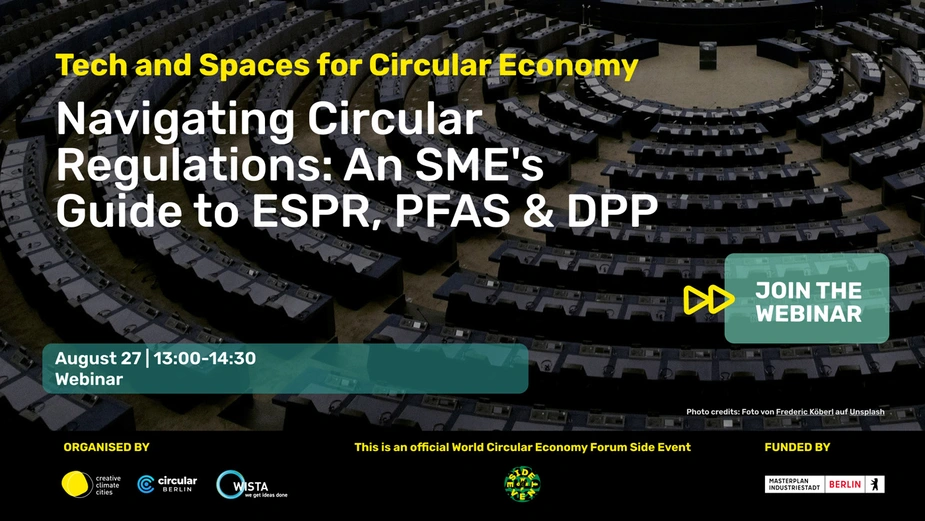Navigating Circular Regulations – An SME's Guide to ESPR, PFAS & DPP
-
Creative Climate Cities, Circular Berlin, WISTA Management GmbH
How can complex regulations become a competitive advantage.
Small and medium-sized enterprises (SMEs) often face mounting regulatory pressures in their circular economy transition: from the EU’s Ecodesign for Sustainable Products Regulation (ESPR) to looming restrictions on substances like PFAS. These frameworks are not just compliance burdens, but can be powerful drivers for innovation and strategic growth. While the necessity for sustainability and resource efficiency is often clear to many SMEs, limited capacities and budgets frequently present a major hurdle to proactively engaging with complex transformations like the circular economy.
Precisely in the context of these challenges and the demand for practical solutions, Optics, Photonics, and Materials Science (OPM) technologies offer unique and transformative opportunities not only to meet the principles of the circular economy but to actively advance them and provide initial concrete courses of action.
Addressing the Key Questions:
- How can small and medium-sized enterprises (SMEs) navigate new circular economy regulations like ESPR and PFAS restrictions and turn them into opportunities instead of burdens?
- What role do tools like the Digital Product Passport (DPP) and standardization play in building new business models and ensuring long-term competitiveness?
- How can technologies from optics, photonics, and materials science (OPM) support circular transformation and regulatory readiness?
- What concrete first steps can SMEs take to align with circular requirements especially in product design, materials, and compliance?
Target Audience:
This webinar is specifically aimed at Small and Medium-sized Enterprises (SMEs), as well as companies in the Optics, Photonics, and Materials Science (OPM) sectors. It addresses the particular challenges faced by SMEs, such as limited capacities and budgets, and offers accessible and actionable insights to help them navigate and proactively shape the circular economy transformation.
Agenda:
- 13:00 – 13:10
Welcome & Introduction
- 13:10 – 13:25
Anna Trawnitschek | Project Manager Circular Economy, DIN Deutsches Institut für Normung e. V.
Topic: How regulations like ESPR translate Circular Economy Goals into practice
- 13:25 – 13:40
Elliana Jensen-Abieva | Founder, CircularTech – Digital Product Passport Community & Platform
Topic: Making Circular Data work for SMEs with the help of the Digital Product Passport (DPP)
- 13:40 – 13:55
Asli Tamer Vestlund | European Program Lead, Change Chemistry
Topic: PFAS and Beyond: What SMEs need to know about Substance Restrictions in the Circular Economy
- 13:55 – 14:15
Panel & open Q&A
- 14:15 – 14:25
Next Steps & Closing Remarks
Moderators:
Remi Laoubi, Electronics lead at Circular Berlin
About the Project ‘Tech and Spaces for Circular Economy’
This webinar is organised as part of the ‘Tech and Spaces for Circular Economy’ project, led by Creative Climate Cities, Circular Berlin, and WISTA Management GmbH, addresses the challenges of implementing circular strategies. The project explores how innovations in optics, photonics, and materials sciences and spatial concepts can enhance and scale circular practices across industries.
Funded by the Berlin Senate Department for Economic Affairs, Energy and Public Enterprises part of the Master Plan Industrial City Berlin 2022 - 2026 (MPI), this initiative aims to drive resource-efficient production and manufacturing.
